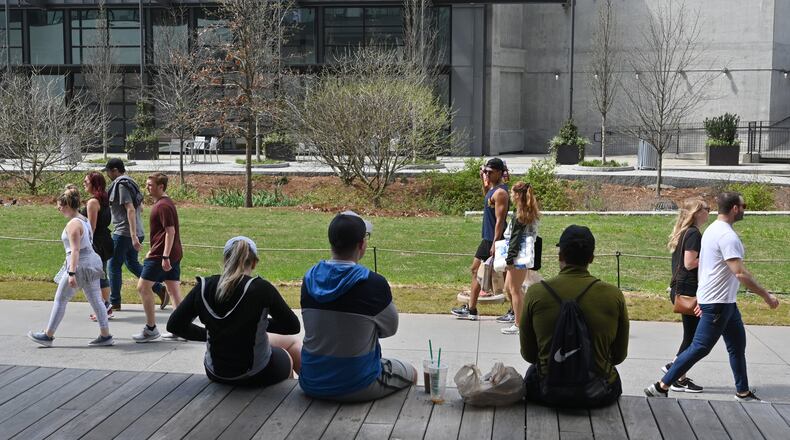Chattahoochee Hills Mayor Tom Reed thought new signs encouraging social distancing could keep one of the crown jewels of his small city, the 800-acre Cochran Mill Park, open even as the coronavirus upended every other aspect of everyday life. Then the crowds came.
“It was a mob scene,” recounted Reed.
The parking lot overflowed. Pavilions and picnic tables were lined with people, many visiting the southwest Fulton city from other parts of metro Atlanta last weekend.
So Reed shut things down. He posted a 14-point notice on Chattahoochee Hills Facebook page late Tuesday announcing that he was closing parks and playgrounds until April 30.
“We were doing well here, and people were enjoying the parks quietly. But as things around us started shutting down and we were the last park left open, it just became untenable,” Reed said.
Parks and trails have offered a much-needed dose of normalcy to homebound metro Atlanta families in recent weeks as the coronavirus has halted nearly every other form of outside entertainment.
But recent photographs depicting crowded conditions on playgrounds, the Beltline and other popular trails have upped the pressure on elected officials to make a gut-wrenching decision: whether to curtail access to the cabin-fevered masses to help stop the virus’ spread.
“I’m very sensitive to the fact that during a time of major disruptions, fear and anxiety, our parks and places of natural beauty offer some much-needed peace and tranquility,” said DeKalb County CEO Michael Thurmond. “However, the things that make our parks so attractive also create a challenge.”
Across the country, officials have closed public beaches and even some iconic national parks out of fears that people couldn’t maintain proper social distancing or could spread the virus to under-resourced gateway communities.
In Georgia, St. Simons was among the coastal cities to close its beaches, and the National Parks Service recently shuttered the Martin Luther King Jr. National Historic Park in Atlanta and the main road leading to the popular Kennesaw Mountain National Battlefield Park.
That hasn't stopped some visitors from coming anyway. Last weekend, walkers and joggers sidestepped the blockades placed at trailheads along the federally-run Chattahoochee River National Recreation Area.
Metro Atlanta officials face their own set of considerations as they mull whether to close areas of outdoor refuge.
There's the bevy of small businesses that rely on foot traffic, as well of the logistics of policing miles of closed parks and trails. Now that K-12 schools are shuttered until March 31, parks and playgrounds have become an even more important destination for young people who lack other places to go.
"That was one of the more difficult decisions that I had to make," Thurmond said of DeKalb's decision to close its playgrounds and recreation centers. The county has opted to keep its parks open for now, unlike Cobb, which shuttered its facilities earlier this week. Gwinnett's parks remain open but playgrounds, tennis courts and other equipment are shuttered.
Atlanta Mayor Keisha Lance Bottoms is facing considerable pressure. She carved out exceptions for parks and the Beltline even as she ordered the city's residents to stay at home earlier this week and shuttered public playgrounds and private clubs, bars, theaters and other entertainment establishments.
Bottoms told members of the Atlanta City Council that she opted to keep parks open after receiving advice from doctors including Emory University’s Carlos Del Rio and CNN’s Sanjay Gupta, who resides in Atlanta and has emphasized the mental health benefits. Bottoms has urged visitors to distance themselves at least six feet from one another on trails and in parks.
“Slowing the spread of COVID-19 remains the number one priority and so residents must understand that in order to continue enjoying our parks and trails, they must abide by the guidelines of social distancing,” the city’s Parks and Recreation Department said in a statement, using the abbreviated name for the coronavirus.
A key test will come this weekend, when temperatures are expected to reach the 80s, potentially drawing more crowds to the metro area’s biggest parks and trails.
Parks “make this situation of isolation a little less isolated, but it only works if we play by the rules of keeping our distance,” said Michael Halicki, executive director of Park Pride, an Atlanta and DeKalb-focused nonprofit.
On Wednesday, visitors at Medlock Park near Decatur insisted they were up to the challenge.
Alex Salvato, a 24-year-old who works in the film industry, said he has a lot of free time on his hands these days and had to get out of his apartment. With local gyms closed, that meant a run outdoors.
“Coming to a place like this, I can keep six feet apart,” he said.
One man who declined to give his last name, Adam, was hitting the trail with his wife and his spirited 5-year-old daughter.
The nearby playground was closed, but Adam said the ability to get out was “everything.”
“With a young one, it’s really important to get outside, get some Vitamin D and let everyone get some fresh air and exercise,” he said. “I’m just trying to stay far enough away (from other people).”
The Georgia Department of Natural Resources, which operates a network of parks and historic sites open across the state, has adopted new social distancing protocols and is making its own pitch to metro Atlanta residents to come visit.
“We have a lot of large properties. People can get out in nature, get out in history, relax and get some exercise and sunshine,” said Jeff Cown, director of state parks and historic sites for the department. “We feel it’s important to provide those opportunities.”
Staff writer Tyler Estep contributed to this article.
About the Author
Keep Reading
The Latest
Featured




